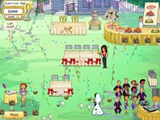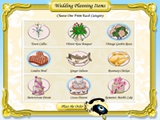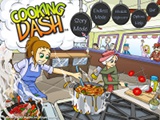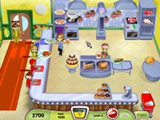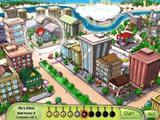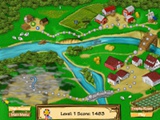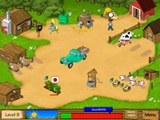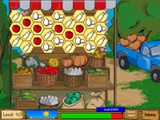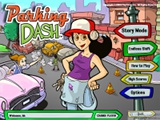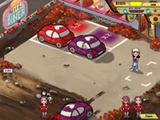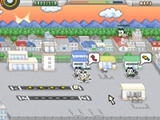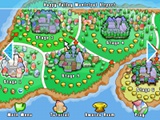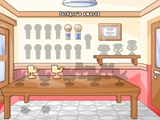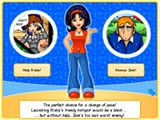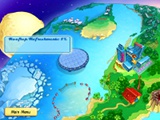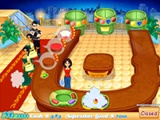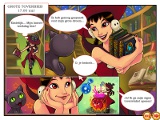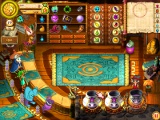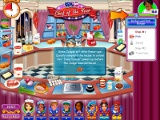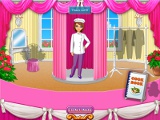





Wedding Dash (demo)
An Acer GameZone demo played just after Dream Day
Honeymoon and a disappointment, because it does have to do with the
mechanics of planning a wedding, rather than finding objects. Guests have to be
seated as they arrive, refreshments have to be brought to the tables, and small
disasters must be resolved (by lots of clicking), before they all hop off to the
dance floor to boogy down. The introduction comic tells how Quinn, the main
character, accidentally volunteers to be someone's wedding planner, then
stresses out in the same yoga class as Flo (of Diner Dash and Cooking Dash fame) and gets a pep talk that prepares her for her
task. The game graphics are "Flo" quality, ie. simple and ugly. The background
music is the solemn "walk to the altar" tune when the game opens, and jazzy once
the wedding is underway.
This is one of the many "Dash" games, mostly by the same company, that are
basically adaptations of the "dashing waitress" game: seat customers (who are
one of a set of types), serve customers, collect tip, clean up; it starts simply
but becomes more complicated as more seats and customers are added, the number
of possible dishes multiplies, and some need multiple steps to prepare. What the
customers want is generally shown by a balloon above their heads. The customers'
patience decreases steadily, and the longer they have to wait, the lower the
reward will be. The game allows several user profiles, as is standard in casual
games these days. There are two standard play modes, "story" and "endless". In
story mode, there is a closing time, the player has to achieve a minimum goal
(and an optional expert goal) per day, and each day brings new complications and
the possibility of buying upgrades, like objects of amusement that will increase
the customers' patience, or decorations to make the game less bare and ugly. The
routine of serving may also be broken up with minigames. When the last day is
finished, the game is over and won. In endless mode, there is no closing time,
although as time passes complications may be added as in story mode, and the
player is just trying to keep up with the flow of customers.
In this game, the customers are the wedding guests who want to be seated at a
certain table or (not) next to a certain person, the waitress's job is to take
their presents to the happy couple and serve them three courses in succession,
after which they go to the dance floor, the interim mini-game is the guessing
game before each marriage of which foods and honeymoon location the couple want,
based on a short description, and the complications are more guests, more
tables, and little snags that need smoothing over, like fighting bridesmaids and
aunt Ethel who always starts crying at weddings. In tune with the theme, the two
playing modes are called "Story" and "Endless reception".
Cooking Dash (demo)
Another Acer GameZone demo, that I initially mistakenly called Diner Dash.
Both games center on Flo, specialist in fast food. In this game, the cook
(called "Cookie") at the diner belonging to Flo's grandmother, is offered an
interview on TV. He refuses out of loyalty to his employer, but his fretting
causes him to practically set the place on fire, so Flo tells him to just go.
Now Flo and grandma will have to take over; permanently, they find out, because
Cookie gets his own cooking show. The characters in this game are all ugly flash
animations; fortunately, the restaurant and foods look better.
As implied under Wedding Dash, this game is like a template
for all time management games: customers arrive. Take customers' orders. Prepare
food. Serve food to customers, before they lose patience and stamp off. (This
means sometimes taking less orders so that less customers are waiting so that
they will be individually served faster.) Take money and tip (commensurate to
speed and quality of delivery). Optional: clear rubbish off table. Got the
basics? Introduce complexities. More items to order, items that need more steps
to prepare, guests that have to be seated in a certain pattern. Continue until
player exits game and tosses laptop out of window while yelling unprintable
words. But, okay, it's addictive.
As is typical of dashing waitress games, there is a story mode and an endless
serving mode, but where the story mode in any kind of game usually has a graphic
of connected dots on a map, this game's "calendar" is a numbered row of
saucepans. Another feature that doesn't make it into every time management game:
extra points for putting customers on the same seats as their clothes colour.
Most time management games award bonuses to "chaining", ie. doing the same thing
twice in succession, like waiting for two customers to order a dish and then
grabbing two of that dish. Many also give bonuses for reusing items, like
preparing the same dish in one pan as often as possible. In this case, the bonus
is for seating a, say, red-suited customer on a red chair as often as possible,
although it's not always possible to seat each customer individually, as they
may come in twos, and need two free seats side by side.
Dairy Dash (demo)
Yet another Acer GameZone demo. Acer sure filled up that laptop with
timewasters. With finer graphics, in the same style as Cake Mania
2 below, its story begins with a rather disconnected family - when dad comes
home from work, he is shushed rather than welcomed as the other family members
are all busy and don't want to be disturbed - hearing that a relative is about
to lose his small, organic farm due to competition from the big players. Flo
tells them that she knows enough restaurants looking for organic produce, so dad
decides that they will save the farm - or rather, he will, as he finds the other
family members have scattered. As the game progresses, they will be re-added one
by one, and there will be talk of how the honest country life has brought the
family back together, blah, blah, blah...
Chaining (planning the same action twice or more in succession) is not only
rewarded but, in this game, makes sense. There are several animals (cow, goats,
chickens) that go through a cycle of waking from sleep, eating, drinking, having
their produce (milk, eggs) collected and then taking another nap before the
cycle starts again, and, as shown in the tutorial that the game starts with,
it's a good idea to grab four lots of feed when they all wake up, then four
buckets of water for when they finish eating, although sadly they go out of sync
after a while. As in many "dash" games, their patience is shown by a string of
six little hearts that decreases as it runs out, and boy, do they get red in the
face if I don't deliver what they want RIGHT NOW. It is important to prevent
this, as the harvest, and therefore the amount of money made, depends on their
mood; for the profits made in a day, the game has a minimum and expert goal, and
scoring the expert goal is unexpectedly hard. As days pass, the game adds more
animals and a vegetable patch, that shows its displeasure by wilting
dramatically.
As usual, the game has a story mode, an endless mode, and a trophy room, one
of the trophies being won by meeting the expert goal every day. The endless
mode, unlocked once the story mode has been started, but not necessarily
finished, acts as a spoiler in that I can choose one of three farms, in
Dinertown, Meatropolis or Puddington, and as time goes on the additions that
would have been announced per new day - more animals, but also aids like the
telephone, truck, lemonade stand and not to forget added family members - are
now simply added, so that I can see how the farm will grow, until its needs
overwhelm me and I lose the game. On the other hand, in story mode I regularly
get a breather and interim games, including a match-3 game.
Parking Dash (demo)
Of all names that main characters in time management games are given, "Karma"
has to be the weirdest. One day, she gets a hurried-looking visitor telling her
she's inherited a piece of property. She's jubilant at being able to leave her
crummy old apartment, but her mood turns when she's taken to... an empty
concrete plot. The man who took her there can't stay as he says he's
double-parked, so, left on her own, she's receptive to a shady developer's offer
to sell the property. Up comes none other than Flo, warning her that the
developer's plan to build more shops will make Dinertown's parking problem even
worse. So, what better use for this empty plot than to turn it into a paid
parking space?
So, Karma becomes a parking attendant, and the dashing waitress game template
is applied to customers who leave and pick up their cars. She starts with a
block of four parking spaces, two against a wall, so the tutorial explains that
cars parked for a long period should be parked next to the wall so that cars
parked for just a few minutes can go in the more accessible spaces behind them,
although if a car that's about to be picked up gets blocked in, the other cars
can be moved around - this suggests that of the four squares, one should always
be kept free. There is a story mode, in which I presume the shady developer will
attempt foul play, and an endless shift mode, although instead of a trophy room
there is just a high-scores screen.
This game has the same quirk as Cooking Dash: that
customers, in this case cars, should be put on a square of the same colour; if I
park a green car on a square, it gets a green glow, and every next green car
parked on it means bonus points. It also has the same graphic style: beautiful
backgrounds - the leaves scattered on the concrete are very pretty - but ugly
characters. Although potentially addictive, I can already tell that this game is
going to bore and frustrate me.
Airport Mania First Flight (demo)
After all the Dash games, it was a change of pace to find a Mania game among
the Acer Gamezone demos. To start with, anyway, because even though I made
supreme score after supreme score the first few days, the game soon increased
the workload to a point where I was no longer able too keep up. That's the first
difference with the preceding games; rather than a minimum goal and expert
score, this game has goal, master, expert and supreme scores. It also lacks the
"endless" mode, although it does have an awards room (awards are given for
accomplishments, but also for things like the game itself adding a new kind of
aeroplane to the traffic) with a camera icon that takes a picture of the award
screen (minus camera icon) and puts it in the user's Picture directory. (With my
flattering Windows username at the top, of course.)
The basics are deceptively simple. A cute little plane in a pastel shade
flies around above the airport. I click on it and then on the landing strip to
bring it down. While it's still flying, I can also assign it to a gate to unload
its passengers. This gate will take on the plane's colour, and I get bonus
points for sending planes to gates of the same colour. There are three gates
versus four colours of plane, and sometimes I get one incoming red plane after
another, so of course this can be tricky. There are special parking spaces for
planes waiting to unload, and one of the upgrades I can buy is a space where I
can repaint planes to the right colour for a vacant gate. While the plane is
unloading, I can't select it. Once it's done, it lets me know with an image in a
balloon whether it needs refuelling or repair, and after that, it reloads and
departs; these actions can be chained by clicking a gate and a runway. The
planes burble happily, unless they have to wait too long, in which case their
faces turn angry; if not brought in on time, they may even leave in search of a
more efficient airport. As an extra distraction, a helicopter may fly past
which, if clicked on, drops bags of money.
The progress screen is too wide for its screen size; scrolling to the right,
I count 8 stages, each with a curving line of cupcake-shaped dots to mark every
day, the finished days topped with a number of stars to indicate their score.
The burbling planes are adorable, but since I started running into problems
before even finishing stage 1, I'm pessimistic about ever being able to play out
the whole game.
Cake Mania 2 (demo)
A final Acer GameZone time management demo, belonging to the Cake Mania
series. The Cake Mania games are popular both for their choice of subject
(cakes, yum yum) and their better quality graphics. Though still simple, these
are actually nice to look at. There are by now six Cake Mania titles out,
showing just how much game pleasure can be wrung out of baking, icing and
delivering different shapes of cakes in many different environments.
This second game starts with the heroine feeling bored in her grandparents'
cake shop. As an example of "be careful what you wish for", she's called by two
friends who desperately need her help, and the player has to make a choice:
chique dessert boutique, or waterworld amusement park? The player is then pulled
into a wide view of the "world map" showing the locations where she operates,
and given a tutorial to prepare for the first day. The minimum and expert scores
are called "baker goal" and "superstar goal", and there is a simple screen for
high scores; the money made can be spent on enhancements like a faster oven and
new toppings. When I start Cake Mania 2 after that, I can choose between
starting a new game, continuing a saved one or playing in endless mode, which I
haven't tried. I can also replay a day in any location, which I did for the
first day at Rooftop Refreshments in a vain attempt to reach the superstar goal.
The graphics for this game are not only bright and polished, they are funny,
and may be backed up by funny sound effects. The old ladies announce themselves
with a creaky "hello dear", while a guitar riff plays for every heavy metal
customer. Out of the movie stars' handbags poke the rat-like heads of
chihuahuas. Their cake demands vary from run-of-the-mill to bizarre; starting
with a single frosted cake, they move to tiered cakes with toppers. For the
graphics alone, this game is definitely on my to-buy list.
Mystic Emporium
The second time management game that I really, really liked. Apart from "Cake
Mania" quality graphics, the premise, for once, has nothing to do with food.
This was one of the demos installed by the games bought at the supermarket, so
it's the Dutch version, and I paid much more for the unlocking code than if I'd
simply bought the English version off Oberon's site; but at the time I didn't
know how addicted I would become to these games. A young witch, with cute skull
jewellery and a cat that somehow obscures the top of her pointy hat when lying
on it, fulfils her dream of starting her own potion shop. She starts with just
two potions. The number of potions increases to six, the equipment can be
upgraded over time, and shelves can be bought for surplus potions. Each day has
a minimum and expert financial target; attain the first, and the game moves to
the next level; achieve the second, and the day in the progress screen (third
screenshot) is shown as a double star. To keep the player in a good mood despite
all the stress, the background music plays a merry little tune. There are awards
for things like not losing any customers for 10 days running, and boy, do some
of those customers have short tempers. Every few days, you can play for one of
three amulets - one that increases tips, makes a plant grow its seeds faster, or
causes the firebird to grow feathers more quickly - in a samegame. One would
think that a game offering only 24 levels or "days" would be finished pretty
soon, but since I'm a slowpoke, I'm usually stuck at day 23. (A day after
writing this, I managed to reach the target for day 24 and get the end screen,
where the shop is declared best magic shop in town and the customers
congratulate its owner. But I still can't reach the "expert" target for the last
three days.)
This game has a trophy room with trophies for things like always using the
same cauldron for one recipe or not losing any customers, but as far as I can
tell it has no endless playing mode.
Go-Go Gourmet: Chef of the Year (demo)
Do not play this game if you are on a diet. A demo that came with Fabulous Finds, it is also a sequel, and its main
character, already established as a master cook, now has to win a title as
international master cook. How? By being the fastest short-order cook around.
This is no "slow food"; she is shown a recipe and instruction and then has to
grab ingredients from all over the counter, put them in the right containers for
processing and serve up the result to the judges, who rate her only by how fast
she delivers. Her competitors are a bunch of ethnic stereotypes from other
countries. Each day, the slowest chef loses and is kicked out of the
competition, but has a plausible excuse why, insinuating foul play. It is easy
to stay at the top, at least for the first few days covered by the demo, and for
every success our heroine wins another outfit that you can change her into in
the dressup screen; not a frivolous activity, as what she wears can affect how
the judges rate her. What she also wins: recipes! After I'd finished playing the
demo, shut down the laptop, done a million other things, and attached the
printer to the laptop an unspecified number of days later to print out some
document, the first thing to roll out of the printer was a two-page apple pie
recipe that the game still owed me. I don't remember anything about the
background music's quality (let's face it, in the rush, it's the first thing you
stop noticing) but the graphics are nice and glossy. Even the food looks good to
eat.
Both Go Go Gourmet games were combined with the Tasty
Turbo Trio in the now no longer available bundle called Foodie Fun Five
Pack.
